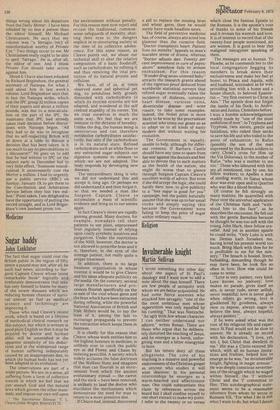Medicine
Sugar baddy
John Linklater
The fact that sugar could cost the British public in the region of fifty pence a pound may not, after all, be such bad news, according to Surgeon Captain Cleave whose latest remarkable book* logically and irrefutably demonstrates that man has only himself to blame for many of the newer diseases which are reducing human chances of survival almost as fast as medical science and technology are improving it.
Those who read Cleave's recent work, which is based on a lifetime of methodical clinical research on this subject, but which is-written in good plain English so that it may be enjoyed by doctor and layman alike, will be astonished at the apparent simplicity of his deductions and at the widespread range of human suffering indisputably caused by an inappropriate diet, to which the human body has not yet been adapted in its evolution.
The observations are part of a wider picture. We are, in a sense, all suffering from a form of collective conceit in which we feel that we can assault God and the natural laws which govern the other mammals, and impose our own will upon The Saccharine Disease. T. L. Cleave (John Wright, Bristol) £1.75 the environment without penalty. For this reason men now reject and re-cast the traditional, commonsense safeguards of morality, shutting their eyes to the dangers implicit in re-structuring society at the time of its collective adolescence. For this same reason, as Cleave points out, we abuse our technical skill to alter the relative composition of a basic foodstuff, such as carbohydrate, by refining it and thus removing the vital protection of its natural protein and cellulose.
We have, all of us, at times observed some sad spherical pet dog, its pendulous belly grossly distended with carbohydrate to which its enzyme systems are not adapted, and wondered at the self centred stupidity of its owner. Yet we treat ourselves in much the same way. We feel that we are immune to the dictates of heredity. Unlike the dog, the human being is omnivorous and can therefore metabolise carbohydrates satisfac torily, but only if the carbohydrate is in its natural state. Refined carbohydrate such as white flour or any extracted sugar subjects our digestive systems to stresses to which we are not adapted. The body responds by developing new diseases.
The extraordinary thing is why we did not understand this and accept it, long ago. Or perhaps we did understand it and then forgot it, so that we needed a man like Surgeon Captain Cleave to accumulate a mass of scientific evidence and bring us to our senses again.
In fact Cleave's views are rapidly gaining ground. Many doctors, for example, nowadays tell their patients to use plain, unprocessed bran regularly instead of relying upon costly synthetic laxatives and purgatives. Under the restrictions of the NHS, however, the doctor is not allowed to prescribe bran and it is, therefore, in the eyes of the average patient, not really quite a proper treatment.
In addition, there is no large business organisation in whose interest it would be to give Cleave and his ideas adequate publicity on the media. On the contrary, several large manufacturers and processors flourish specifically on the re-sale of the vital wheat germ and the bran which have been extracted during refining, while the powerful National Association of British and Irish Millers would be, to say the least of it, among the last to ei.courage propaganda to prevent the extraction which keeps them in business.
It is chiefly for this reason that Cleave, whose work entitles him to the highest honours in medicine, is unlikely ever to catch the public eye as did Florey and Chaim by isolating penicillin. A society which widely acclaims the false doctrines of the Welfare State and imagines that man can flourish in an environment from which the ancient evolutionary stimuli — the carrot and the stick – have been removed, is unlikely to laud the doctor who elucidates the mechanisms which demonstrate the need for man to return to a more primitive diet.
If Cleave had, instead, discovered a pill to replace the missing bran and wheat germ, then he would surely have made headline news.
The field of preventive medicine has, of course, always attracted less glamour than the curative field. "Doctor transplants heart. Patient lives six months" ppeals to man's macabre sense of drama, whereas "Doctor adjusts diet. Twenty per cent improvement in cure of peptic ulcers" somehow fails to arouse enthusiasm. For this reason "Wonder drug saves wizened baby" attracts the research grants ahead of the rigorous proof deduced from worldwide statistical surveys that refined sugar eventually raises the incidence of diabetes, coronary
• heart disease, varicose veins, diverticular disease and • acne rosace, to take some examples. Indeed, the Nobel prize is more likely to be won by the procrustean scientist who trims our genes so as to adapt us to all kinds of nasty modern diet without waiting for evolution.
The Government is, equally, unable to help, although for different reasons. If Barbara Castle should have any time to spare from her war against the doctors and feel able to devote this to such matters as the health of the nation, she might do worse than to glance through Surgeon Captain Cleave's excellent words of advice. But even if she did accept the logic, she could hardly dare, now, to give publicity to a "less sugar is good for you" campaign, lest the public naturally assume that she was up to her usual tricks and simply saying this because the Government were failing to keep the price of sugar within ordinary reach.


































 Previous page
Previous page